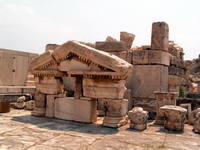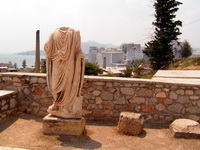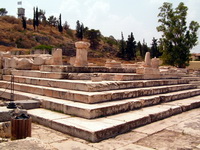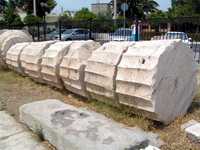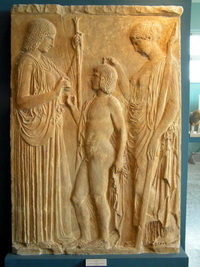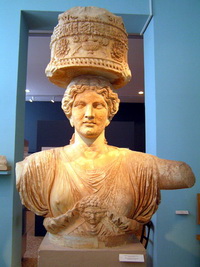
Elefsina, Greece
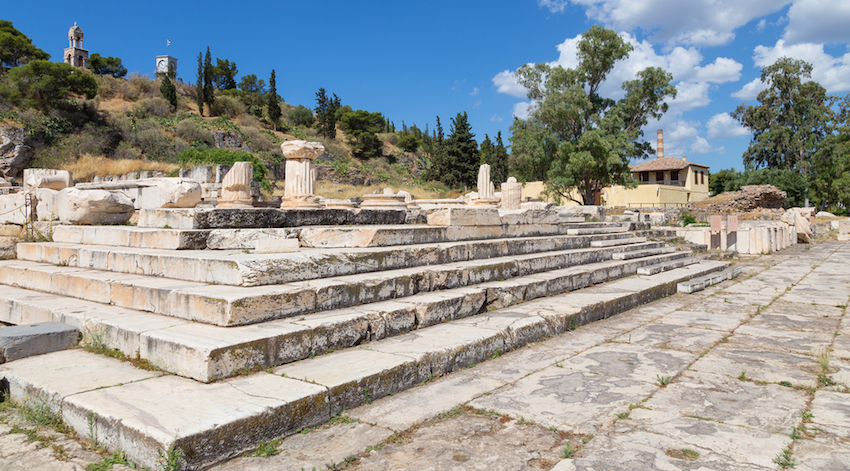
The Curse of EleusisMost people know about Lord Elgin and the Parthenon Marbles. Less known is the story of Edward Daniel Clark and the curse of Saint DimitraThe city of Eleusis, now known as Elefsina, a city between Athens and Corinth, was built around the sanctuary and temple of Demeter, the goddess of crops, which dated back to Mycenaean times. In the classical period the city was the site of the Eleusian Festival when thousands of pilgrims walked the sacred way from the Acropolis to be indoctrinated into the ancient mysteries. To divulge the secret of the Eleusinian Mysteries was punishable by death and for 1400 years these secrets were known only to the initiates. The site was the second most important in ancient Greece, after Delphi.
The sacred rites were such a well kept secret that they are still unknown, (though a very good description of the ceremony is included in ATTIKA:GREECE BEYOND THE GUIDEBOOKS by John Tomkinson), but all the well known Athenians became initiates including Socrates and Plato. People came from all over the Greek world to be initiated and later in the Roman period, the Emperors Hadrian and Marcus Aurelius made the journey all the way to Eleusis for this purpose. The rites included fasting, meditation and spiritual visions, perhaps brought on my hallucinogenic drugs, or maybe a method of tapping the inner resources of the initiates. Whatever went on there, it certainly made an impression on the ancient world. Eleusis was truly one of the holiest places on earth. Then something happened. Edward Daniel Clark like Lord Elgin, was a collector of Greek antiquities at the turn of the nineteenth century. His greatest find was a colossal statue, a bust of a woman with a basket on her head which was held in veneration by the people of Eleusis. The locals called the statue Saint Dimitra, based on a local legend with amazing similarities to the myth of Demeter and Persephone, only in this story the daughter is carried away by a Turk and Dimitra is a Christian. Regardless, the ancient statue, which was buried up to it's neck, was regarded as the reason for Eleusis being so fertile. This statue became the object of desire to Clark who wanted to take back to England with him. Needless to say, the locals were very upset and feared that the removal of the statue, which protected their corn fields, would be the end of their farming. But Clark got permission to take the statue from the Turkish Governor by bribing him with a telescope, and began the chore of removing it. When after much work and a few setbacks the statue was put on a boat, the locals were sure that it would be shipwrecked. They were right and the boat sank, but the statue was recovered and sits in a corner of the Fitzwilliam Museum in Cambridge, England where it is barely noticed by visitors. Since then Eleusis has been transformed. The following year the harvest was good, but the next year it wasn't and things only got worse. Then a factory for making soap was built near the ancient site, followed by the industrial development that has turned what was once the sacred city of Eleusis into an industrial nightmare, the most polluted area in Greece, an ecological wasteland and testament to man's greed and short-sightedness, beyond anything the people of Eleusis could have imagined when their beloved statue was removed. The Statue of Saint Dimitra or Demeter was perhaps the oldest continuously venerated statue in the world. Now you can't even find a photo of it searching with Goggle. Will the return of the Statue of Saint Dimitra or Demeter solve the problems of Eleusis? Maybe not. But it can't hurt and who knows if the power of the ancient Gods and Christian Saints combined can undo the damage modern man has caused? Send an e-mail to the Fitzwilliam Museum in Cambridge and ask them to return the statue of Demeter-Saint Dimitra to it's home of Eleusis, Greece: fitzmuseum-antiquities@lists.cam.ac.uk You can click on any of the photos on this page and see them full size. More Useful Information
|
Help Support Matt's Greece Guides
Do you enjoy using my site? Have you found it entertaining as well as useful? If so please show your appreciation by booking hotels through the travel agencies and the links found on my Hotels of Greece site. The small commission I make on the bookings enable me to keep working and in most cases you won't find them any cheaper by searching elsewhere.
You can find
hotels in Greece by location, price, whether or not it has a swimming pool, and see photos and reviews by using this link to booking.com which also contributes to my website when you book. If you are appreciative of all the free information you get on my websites you can also send
a donation through Paypal or Venmo
Join Matt Barrett's Greece Travel Guides Group on Facebook for comments, photos and other fun stuff. If you enjoy this website please share it with your friends on Facebook and other social media.
